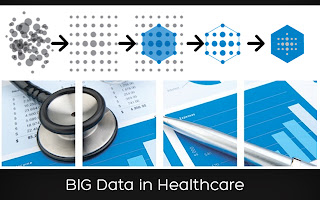Based
on the analysis made so far on the effect Big data on restraining
healthcare cost, it is being suggested that the industry stands to
save an approximate amount to the tune of $450 bn. Further
improvements and suggestions which are bound to come by as more
research is done in this field will only result in more savings.
Important suggestions made so far include doing away with the fee-for
–service as a method of payment and change in the mindset of the
providers and patients to accept the benefits of making use of data.
The second point is highly critical. Unless there is a change in the
approach on the part of the stakeholders in terms of their
willingness to use the recommendations suggested by the analysis
which comes with the sue of data , it will be next to impossible to
actually start realizing the benefits of the approach. A case in
point could be as simple as the following. No matter how much of
investment and research is done in the field of fitness and exercise,
the true benefit can never be passed on to people if they continue
with the sedentary lifestyles as they have been for all this while .
What big data analysis might provide as an input is the importance of
exercising and some metrics to prove how it can possibly help people
with a better lifestyle. But no matter how many new exercising
techniques are suggested, the benefits can never be realized unless
people actually start devoting time to fitness. Experiments done in
controlled conditions have indicated that even if simple
interventions were made successfully, on the large the results will
lead to huge savings. This however will require physicians to combine
their treatment methodologies with bog data. Although one of the
major factors to distinguish one physician from another is their
ability of judgment for treatment decisions, there is no harm if they
were to combine it with big data usage and multiply the benefits.
This however requires a paradigm shift in their openness to this
field and a willingness to apply the recommendations.
Various
developments over the last two decades in healthcare have resulted in
the industry reaching this juncture at which the benefits of
harvesting on the data available seem to have a lot of potential.
Providers and Payers have digitized their medical records,
Pharmaceutical companies have been supplying huge amount of
information related to research and development into medical
databases. Information from clinical trials and insurance programs
are available and most importantly it is possible now to collect and
analyze data from multiple sources. However the major factor which is
responsible for driving up the demand is that of rising fiscal costs.
There is now a huge need among healthcare stakeholders to compile and
exchange information. This has been the result of a shift in
healthcare delivery approach which is taking place. The tradition
method of delivery where the payment was based on treatment volume
resulted in high cost escalation which has compelled adoption of
models where payment is related to the outcome and just not on the
delivery of service. Since it is now the outcome which is of
importance the stakeholders have started realizing that the costs can
be brought down and results better achieved if there is more cohesion
in their approaches and there is avoidance of repetition of
processes. For this to happen it is imperative that they have access
to common data and systems which make it possible to exchange
information. Thus the need for availability of data and its
harvesting has never been more.
Physicians
who till now have relied on their judgment to take treatment related
decisions have also started noticing the benefits of more
evidence-based decision making. The process is based on taking inputs
from systematic reviewing of clinical data and letting the best
available information impact treatment decision. The important point
here is that, surveys have indicated that the early adopters of this
new approach have already started drawing the benefits. This is not
only encouraging but could mean the beginning of a new era in the
healthcare industry which till now has not been banking on use of big
data compared to others like the retail and banking. There are bound
to be roadblocks ahead but the journey nevertheless seems to have
started already. Healthcare
software development teams can help you build clinical and
EHR/EMR software projects within allocated budgets and time
schedules.
We
provide Healthcare
software testing services. If you would like to know more about
our certified Healthcare
software developers, please get in touch with us at Mindfire
Solutions.

No comments:
Post a Comment